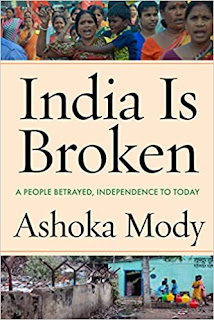 EuroTragedy: A Drama in Nine Acts (2018), and his writing appears often in outlets such as Financial Times, Project Syndicate, and Bloomberg View.
EuroTragedy: A Drama in Nine Acts (2018), and his writing appears often in outlets such as Financial Times, Project Syndicate, and Bloomberg View.
Mody applied the "Page 99 Test" to his new book, India Is Broken: A People Betrayed, Independence to Today, and reported the following:
The Page 99 Test works remarkably well for my book. On that page, I describe the alarming rise in the difficulties Indians faced in finding a job. And I relate that failure to a poorly educated workforce unable to compete in the markets for global labor-intensive exports. The context is the final years of Jawaharlal Nehru’s tenure as prime minister. As I write,Follow Ashoka Mody on Twitter.Official Indian documents reported the rise in underemployment and unemployment in blunt words. The draft outline of the Fourth Plan impatiently said of the previous three plans (1951-1965): “Successful plans on development are unable to find gainful employment for the net addition to the labor force and continue to add to the backlog of unemployed persons.”In contrast, Korea, with a well-trained and well-educated labor force, was “outcompeting Japanese producers in labor-intensive exports.”
Fast forward to 2004, I write of “India’s most intractable problems: substandard education and weak job creation. Together, they represent the broken rungs of India’s economic ladder.” By now, the global competitors were Vietnam and Bangladesh. Vietnam was following the classic East Asian playbook that Korea and Taiwan had used in the 1960s. Bangladesh was racing to catch up and, by 2012, go ahead of India in the export of clothing, bringing women into the workforce in the process. Every success story reflected better education, greater agency of women, and more jobs.
More broadly, I depart from the convention of using GDP as a metric of economic progress. Instead, with my focus on jobs and public goods such as education, health, livable cities, clean air and water, and fair and responsive judicial system, I place the spotlight on the lived reality of Indians through the 75 years since India’s independence. That lived reality is getting harder as social norms and public accountability continue to erode, placing India at a dangerous impasse. Large stretches of most rivers are dying because of rampant abuse and a marauding climate crisis is further damaging prospects for honorable living.
The erosion of norms and accountability is also inflicting huge damage on Indian democracy, leading a recent international assessment to rightly conclude India is an electoral autocracy.
India set off on a hopeful journey 75 years ago. Despite the current hype of an India on the move—stirred up by elite Indians living in first-world gated communities—and echoed by international elites, persisting Indian dysfunctions may be hard to roll back.
--Marshal Zeringue



